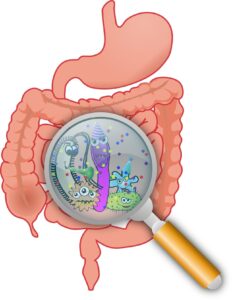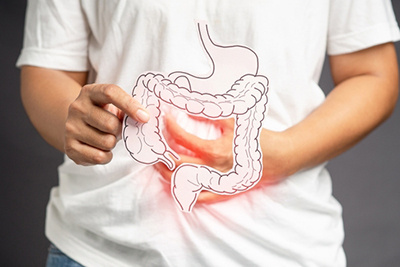Irritable Bowel Syndrome (IBS): Symptoms, Causes, Diagnosis, and Treatment
Irritable Bowel Syndrome (IBS) is a common gastrointestinal disorder that affects a significant percentage of the adult population globally, leading to recurring abdominal pain, bloating, and changes in bowel movements. IBS is considered a chronic condition, with symptoms varying from person to person, but it can be effectively managed with the right approach.
What is Irritable Bowel Syndrome (IBS)?
Irritable Bowel Syndrome (IBS) is a functional gastrointestinal disorder characterized by discomfort in the abdominal region, altered bowel habits, and bloating. Although the exact cause of IBS remains unclear, several factors are thought to contribute to its development, including genetic predisposition, gut motility abnormalities, stress, food intolerance, and hormonal changes.

IBS
Causes of IBS
While the precise cause of IBS is still unknown, there are several key factors that may trigger or worsen the condition, including:
- Abnormal Gut Motility: Disruptions in the way the intestines move and contract can contribute to IBS symptoms, such as diarrhea or constipation.
- Visceral Hypersensitivity: Heightened sensitivity of the gut to stimuli may result in abdominal pain and bloating.
- Stress and Anxiety: Emotional and psychological stress can exacerbate IBS symptoms or even trigger flare-ups.
- Hormonal Changes: Hormonal fluctuations, especially in women, can influence gut motility and contribute to IBS.
- Food Intolerance: Certain foods can irritate the gastrointestinal system and trigger IBS symptoms.
- Genetic Factors: A family history of IBS may increase the likelihood of developing the condition.
Common Symptoms of IBS
Symptoms of IBS can vary greatly between individuals. Common signs include:
- Abdominal Pain or Cramping: Pain that may be relieved by passing gas or bowel movements.
- Bloating and Gas: A feeling of fullness or distention in the stomach.
- Changes in Bowel Movements: Alternating diarrhea and constipation or chronic diarrhea or constipation.
- Mucus in Stool: The presence of mucus in the stool may indicate IBS.
- Incomplete Evacuation: The sensation of not fully emptying the bowels after a movement.
- Nausea and Vomiting: Digestive discomfort may lead to feelings of nausea.

How is IBS Diagnosed?
There is no definitive test for IBS, and diagnosis is primarily based on symptoms. The Rome IV criteria are widely used to diagnose IBS, which include:
- Recurring abdominal pain or discomfort at least once a week for the past three months.
- Pain associated with at least two of the following:
- Changes in stool frequency (more or less frequent than usual).
- Changes in stool form (loose, hard, or lumpy).
- Changes in stool appearance (mucus or abnormal color).
A healthcare provider will also consider medical history, conduct a physical examination, and may run tests to rule out other gastrointestinal disorders.
Treatment Options for IBS
IBS treatment typically involves a combination of lifestyle modifications, dietary changes, and medications to manage symptoms effectively.
Lifestyle Modifications
- Stress Management: Stress reduction techniques, including yoga, meditation, or deep breathing exercises, can alleviate IBS symptoms.
- Regular Exercise: Physical activity can improve gut motility and reduce symptoms like constipation.
- Adequate Sleep: Good sleep hygiene plays a key role in managing stress and improving overall health.
- Avoiding Trigger Foods: Identifying and eliminating foods that exacerbate IBS symptoms is essential for long-term relief.
Medications
Medications may be prescribed to manage specific symptoms, such as:
- Antispasmodics: To alleviate abdominal pain and cramping (e.g., dicyclomine).
- Antidepressants: Low-dose antidepressants like amitriptyline can help reduce pain and improve bowel function.
- Laxatives: To relieve constipation (e.g., senna).
- Anti-diarrheal Medications: To control diarrhea (e.g., loperamide).
Dietary Changes for Managing IBS
Diet plays a significant role in managing IBS symptoms. A personalized diet plan, developed with the guidance of a healthcare provider or registered dietitian, is highly recommended. Some general dietary guidelines include:
- Eat Smaller, Frequent Meals: Smaller meals help reduce bloating and discomfort.
- Avoid Trigger Foods: Common IBS triggers include gluten, dairy, spicy foods, and processed foods.
- Increase Fiber Intake: Foods high in fiber, such as fruits, vegetables, and whole grains, can improve bowel movements.
- Stay Hydrated: Drinking plenty of water is important, especially if experiencing diarrhea.
The FODMAP Diet for IBS Relief
The FODMAP diet is an evidence-based dietary approach that has shown promise in reducing IBS symptoms. FODMAPs are certain types of carbohydrates that can be difficult for some people to digest, leading to symptoms like bloating, gas, and abdominal pain.
The FODMAP diet includes three phases:
- Elimination Phase: Remove high-FODMAP foods for 2-6 weeks to assess symptom improvement.
- Reintroduction Phase: Gradually reintroduce high-FODMAP foods one at a time to identify specific triggers.
- Modification Phase: Develop a personalized eating plan that minimizes or avoids trigger foods.
Common high-FODMAP foods to limit or avoid include:
- Wheat, barley, and rye (fructans)
- Onions, garlic, beans, and soybeans (fructans and galactans)
- Apples, pears, watermelon, and mangoes (fructose)
- Dairy products, especially those high in lactose
- Sorbitol, mannitol, and xylitol (polyols)

IBS- Irritable Bowel Syndrome
Risk Factors for IBS
Several factors increase the likelihood of developing IBS, including:
- Family History: A genetic predisposition may increase your risk.
- Stress and Anxiety: Psychological stress can trigger or worsen IBS symptoms.
- Hormonal Changes: Hormonal shifts, especially in women, can affect gut function.
- Food Intolerance: Sensitivity to certain foods can contribute to IBS.
- Infections: Gastrointestinal infections may increase susceptibility to IBS.
- Neurological Disorders: Conditions like Parkinson’s disease may also raise IBS risk.
Conclusion
If you’re struggling with IBS, working with a healthcare provider and making targeted lifestyle and dietary changes is essential for effective management. With the right approach, you can significantly reduce symptoms and improve your quality of life. IBS is a manageable condition, and with personalized care, it’s possible to find a treatment plan that works for you. Always consult a healthcare professional or registered dietitian before making significant changes to your diet or lifestyle.

